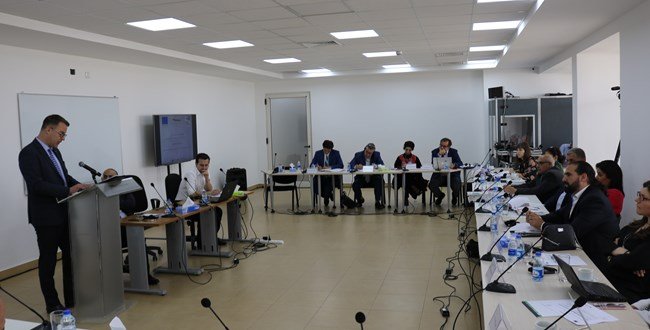Image:

06 May 2018
14 May 2018 <br />
<br />
Amman - The Jordan Media Institute (JMI) and the "Maidan" project held a meeting for a number of experts and academics in journalism and media with the aim of narrowing the gap between journalism education and the media industry and modernizing curricula to keep up with the rapid technological developments and requirements of the modern media industry.<br />
<br />
The participants reviewed ways to bridge the gap between journalism and media colleges and schools and the needs of the industry and media markets in the region. They exchanged experiences and proposals to arrive at a common formula for developing journalism and media education in the Middle East and North Africa region.<br />
<br />
In the opening session, Egidijus Navikas, head of the Political Section at the EU Delegation in Amman, lauded the JMI experience in developing and modernizing journalism education. He noted the EU's role in supporting educational programs at a number of Jordanian universities, including supporting the project of media literacy.<br />
<br />
Navikas stressed that developing journalism and media starts by improving the conditions of educational establishments and that democracy requires professional and free press to promote freedom of opinion and expression.<br />
<br />
Dr. Basim Tweissi, dean of the JMI, said that "examining the features of the systems of journalism and media education at Arab universities and colleges reveals some of the challenges facing the development of media in the Arab world and the missed opportunities through which education was supposed to contribute to developing the profession of journalism."<br />
<br />
He said that "despite the great progress in the media industry in the region in recent years, the gap between educational establishments and the labor market is still large. The market and technology are moving fast, while educational establishments are moving slowly." He added that one of the objectives of this meeting was to close this gap through developing journalism and media curricula.<br />
<br />
The participants in the meeting exchanged experiences in a number of sessions and panels under different titles, including: "Reflections on How To Improve Media Studies in MENA Region," "New Approaches and Best Practices To Address Long-Term Challenges Facing Journalists," "Funding To Sustain Academic Cooperation Networks and Students' Exchanges," "Practical Steps Needed To Achieve Momentum for Updating Curricula To Be More Compatible With Industry Needs," and "How Do We Cooperate Together To Make Things Happen: MoUs, Sharing Programs, Blogs, Exchanges and Research."<br />
<br />
A number of participants also presented papers on their experiences in developing curricula, including "Birzeit University Experience in Developing Three Courses to Teach Media" by Saleh Masharqa; "A Study on Journalism Educational Systems in Nine Arab Countries" by Dr. Basim Tweissi; "Experiences in Student Affairs Management: Legal Frameworks and Engagement in Current and Public Affairs Without Compromising Academic Values or Safety of Journalists" by Emad Al Asfar, Birzeit University; "Contextualization of New Tools and New Forms of Expression" by Dr. Sharif Abdunnur, University of Balamand; "New Training Techniques for Students of Journalism During Times of Fast Social Change and Development" by Dr. Mohammad Al Allaly, the Higher Institute of Information and Communication (ISIC), Morocco; "Research on Journalism Students' Profiles and Media Market Needs in Spain" by Dr. Albert Saez, Ramon Llull University, Spain; "Innovative Thinking, Visual Magic, Firing Imagination of Students Through Creative Expression," by Dr. Zahera Harb, City University, London; and "Preparations Needed for Erasmus Including Criteria of Participants and Preparation of Participants," by Dr. Jaume Suau, Ramon Llull University, Spain.<br />
<br />
The participants will meet again next week in the Tunisian capital as MedMedia concludes after four years of work to announce the results they have achieved over five meetings held in Casablanca, Helsinki, Cairo, Dead Sea, and Amman.



